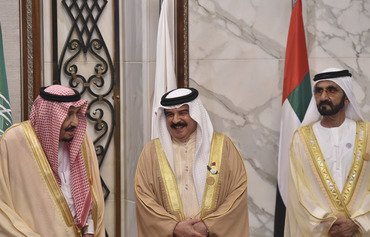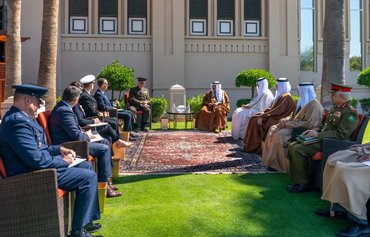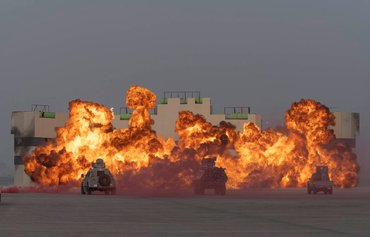A joint Gulf security exercise kicked off in Bahrain last week to enhance security collaboration among the six Gulf Co-operation Council (GCC) member states.
The exercise, dubbed "Arab Gulf Security 1", began October 27th and will continue until mid-November. It is the first of its kind and designed primarily to enhance joint counter-terrorism capabilities among Bahrain, Qatar, the UAE, Saudi Arabia, Oman and Kuwait .
"The shared security of GCC countries is our only option, especially in view of the proliferation of the terrorist crime phenomenon and seriousness of the security challenges in the region," said Bahraini Interior Minister Lt. Gen. Sheikh Rashid bin Abdullah Al Khalifa, commander of the joint exercise.
Arab Gulf Security 1 control authority head Maj. Gen. Tariq al-Hassan, commander of Bahrain's Public Security Forces, said the exercise had been developed to address security threats and regional developments that fall within the purview of GCC security agencies, local media reported.
He described the exercise as " a clear message to anyone who might consider threatening the security of these countries or tampering with their resources ".
Bahrain Consultative Council member Khamis al-Rumaihi said the exercise has "profound implications and is a direct message to foreign ambitions".
It clearly demonstrates the cohesion among GCC member states and also their commitment to support and protect Bahrain, he told Al-Mashareq.
Unifying Gulf security
"The region is rife with political turmoil that has swept many Arab countries, particularly Levant countries, and a lot of unrest caused by terrorist groups and extremism," al-Rumaihi said.
It is therefore imperative that GCC states unify their security and military efforts to defeat any potential aggression, he said, as these states constitute a military, political and economic power to be reckoned with in the region and world.
Holding the Arab Gulf Security 1 exercise will increase co-ordination in the field and identify strengths and weaknesses of the joint field security framework for the various units, agencies and departments, he said.
The tactical exercise "is the forerunner of political and military maturity in confronting the challenges in the region, including regional, terrorist and sectarian interferences", said Bahraini MP Abdullah bin Huwail, who chairs the parliamentary foreign affairs, defence and national security committee.
Gulf states are called upon to continue to conduct advanced military and tactical exercises to enhance the readiness of armed forces and provide them with training on combat and field military operations, he told Al-Mashareq.
This is necessary to keep pace with advancements made by the countries of the region, particularly Iran, he said.
Arab Gulf Security 1 represents "an advanced stage in the process of the creation of a comprehensive Gulf union", he added.
Security and stability are the main pillars of this stage, he said, which requires that problems such as terrorism, drugs, human trafficking and sectarian and ethnic unrest be proactively addressed.
The Gulf states are called upon more than ever to invest more in training, funding and human development at military and security institutions, bin Huwail said.
Regional dangers
Isa Cultural Centre executive director Sheikh Khalid bin Khalifa Al Khalifa told Al-Mashareq the Arab region is experiencing "unprecedented turmoil and civil wars", with unrest also "beginning to loom over the Gulf states".
The security of the region urgently requires military and strategic collaboration and co-operation, he said, and unification of all efforts to protect the homelands.
"As we all know, the external threats, particularly the regional ones, have begun to take a military tack, especially in view of the developments in Mosul, post-Mosul and Syria," he said.
"The most prominent threats we face today are coming from Tehran, which began to intervene in Iraq, Yemen and Syria with words and deeds through its sectarian militias and proxy wars," he said.
GCC leaders are undoubtedly aware of these threats, and are working diligently to "safeguard our homelands from [them]", he said. "But if they come, we are ready for them."
Bahrain’s leadership welcomes joint security exercises out of a desire to see the Gulf united in every aspect, he added.

![The Arab Gulf Security 1 exercise kicked off in Bahrain on October 27th with the participation of the six Gulf Co-operation Council member states. [Photo courtesy of Bahrain Ministry of Interior]](/cnmi_am/images/2016/11/04/6487-Bahrain-gulf-exercise-600_384.jpg)







What's new in Aleppo?
Reply3 Comment(s)
Thank you for this awareness. This cohesion must be supported by a military force because the danger will reach every place where there are Muslims. We need to work hard to mobilize a loyal, disciplined military force that would serve the Islamic and Arab nation.
Reply3 Comment(s)
Wasn't this Bahrain previously part of Iran?
Reply3 Comment(s)